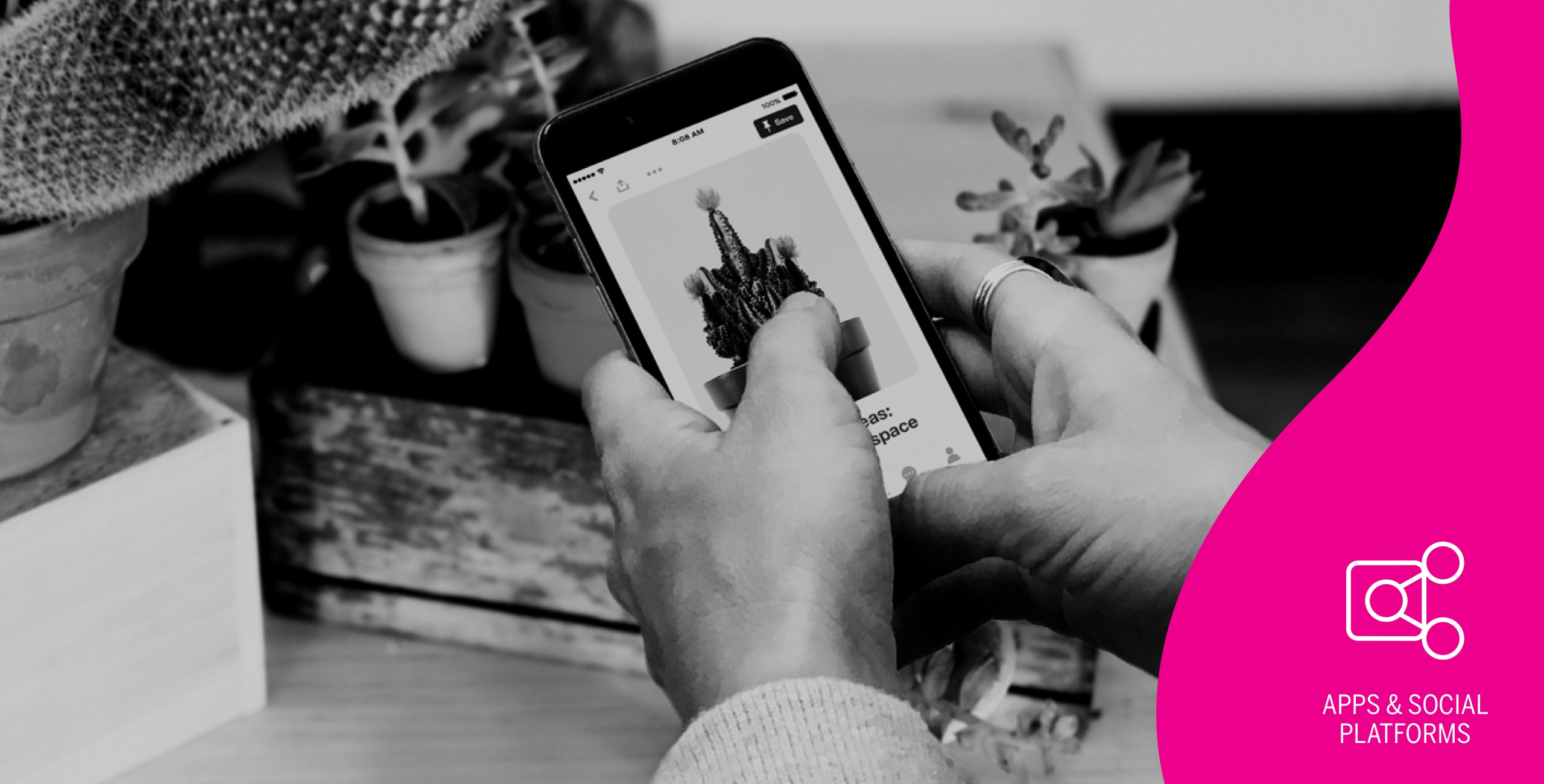Overview
- Pinterest is the top apps & social platforms brand in our 2019 Brand Intimacy Study, outperforming last year’s leader, Apple Music
- Women are highly intimate with Pinterest, ranking it #19 in the study overall
- Pinterest is the #1 brand in the industry for its percentage of users in the most intense stage of Brand Intimacy: fusing
- The brand also ranks #1 in the industry for the archetypes of enhancement, ritual, and identity
The apps & social platforms industry is still in the bottom third of all industries in terms of its ability to form emotional bonds with users; however, it is on the rise. Out of the fifteen industries in our annual Brand Intimacy Study, apps & social platforms moved from #12 in 2018 to #10 in 2019, increasing its average Brand Intimacy Quotient from 18.0 to 25.4.
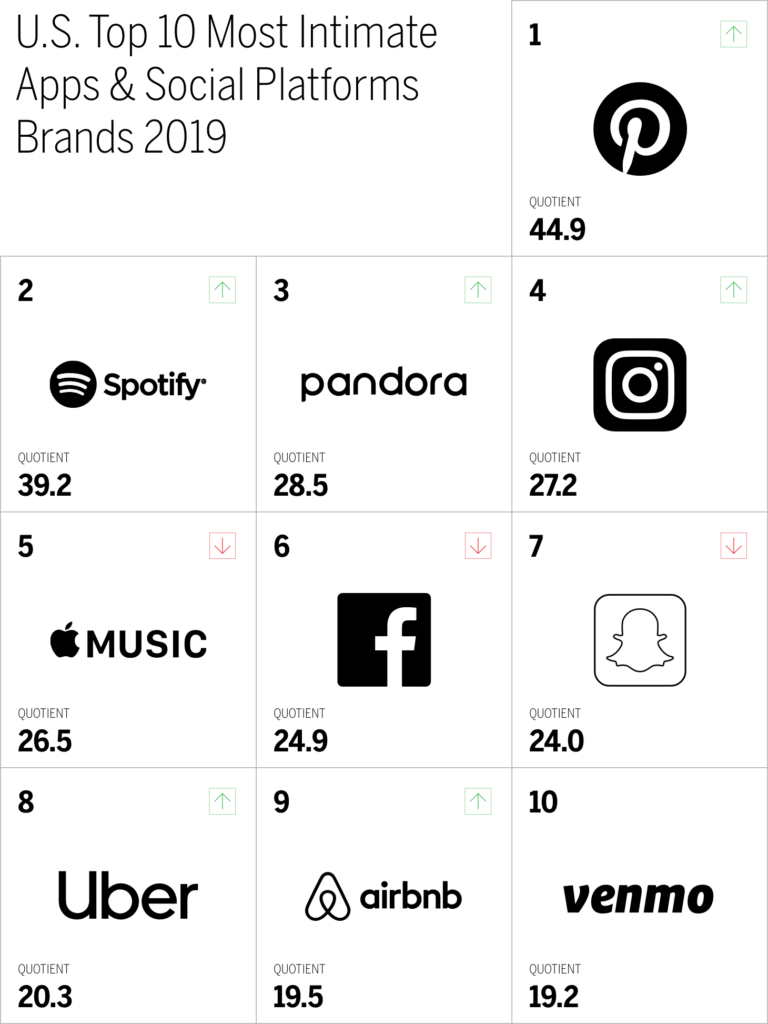
This year, the apps & social platforms industry is dominated by social platforms and music apps, which is similar to last year. Last year’s leader, Apple Music, fell to the #5 position, whereas another brand doubled its score from 22.0 to 44.9, jumping from #4 to the #1 spot: Pinterest.
As a social media platform, Pinterest is both popular and distinct. It recorded 265 million monthly active users at the end of 2018 and is known to be influential in how its users make purchasing decisions.¹ According to Pinterest’s weekly active “pinners,” 90 percent say the site helps them decide what to purchase, and 98 percent report trying things they find on Pinterest, compared to just 71 percent across other social platforms.² This suggests that Pinterest is a particularly valuable platform for both consumers and marketers.
Given Pinterest’s recent success in building Brand Intimacy, its unique position in the industry, and its impending initial public offering (IPO), we are exploring our key findings on the brand from the 2019 Brand Intimacy Study to better understand how users are emotionally connected with the brand.
Winning with women
Pinterest’s most powerful asset is probably its success with women. Among women, Pinterest is the #19 brand in our study overall, with a Brand Intimacy Quotient of 50.9. The brand does especially well with millennial women, ranking #11 for this demographic overall with a Quotient of 54.4. It is also worth noting that Pinterest has a high percentage of women in the most intimate stage of Brand Intimacy, fusing, in which a person and a brand are inexorably linked and co-identified (7 percent of women vs. 5 percent overall). When it comes to men, currently Pinterest doesn’t have a ranking, which is due to its sample of men being too small.
It is significant that the top brand in the industry has a base of intimate users that skews so heavily toward one gender. Clearly, Pinterest has created a social media platform that appeals to women—41 percent of American women reportedly use Pinterest compared to only 16 percent of men—but the brand seems to be broadening its audience as 50 percent of new sign-ups in 2018 were men (up from 40 percent in 2016).³ If Pinterest is able to replicate its success with women with men, it has great potential for growth in the future.
Powerful connections with pinners
In the apps & social platforms industry, Pinterest has the highest percentage of users experiencing Brand Intimacy, with a significant advantage in the most intense stage of intimacy: fusing.
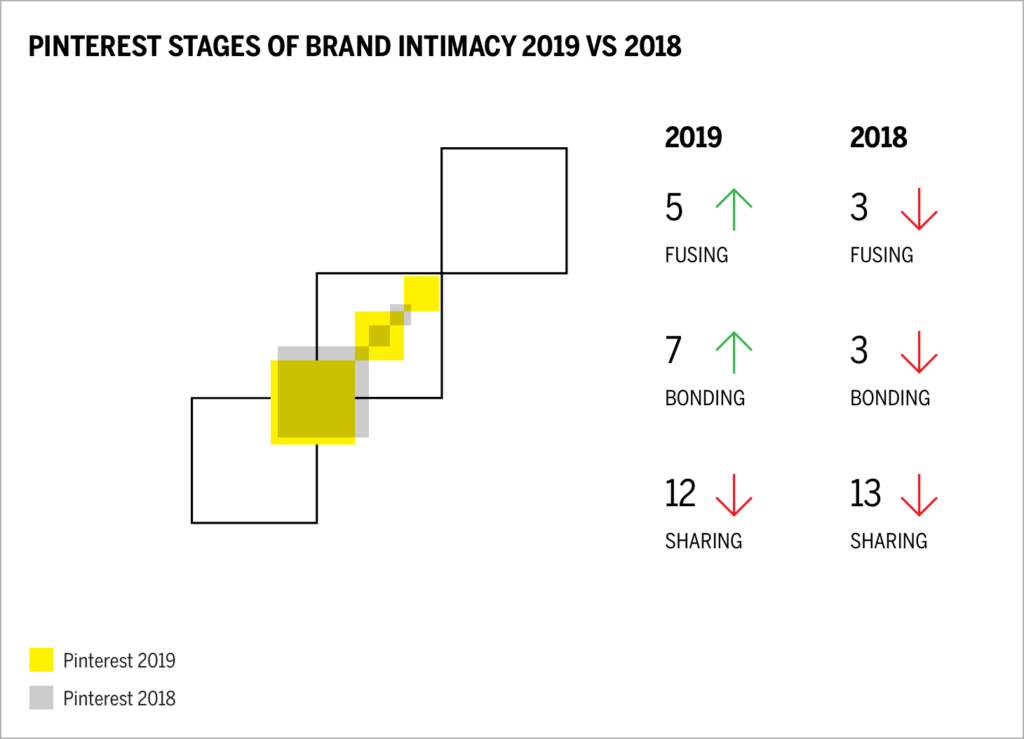
Pinterest has improved its percentage of users in the fusing stage since last year, from 3 percent to 5 percent. This gives the social media platform the highest percentage of fusing users in the category, followed by Spotify, with 3 percent.
Pinterest also saw a significant improvement in the bonding stage of Brand Intimacy, which is when an attachment is created and a trusting relationship between a person and a brand is established. The percentage of Pinterest users in the bonding stage jumped from 3 percent to 7 percent in the past year, making the brand #2 in this metric behind Uber. Pinterest’s success in the bonding stage demonstrates users’ willingness to trust the brand, which is especially impressive considering all the trust issues consumers have had with social media brands in recent years. Whether it is because Pinterest’s format is less vulnerable to divisive communication or because the brand has remained relatively free of controversy (compared to platforms like Facebook), users are simply more willing to trust Pinterest than they are other social media brands.
The growing percentages of users in the more intense stages of Brand Intimacy indicate that Pinterest isn’t just expanding its audience—it’s also deepening it. This is unique to the category, especially among social media brands, which often try to appeal to everyone and end up sacrificing emotional closeness with their users.
Excelling in key archetypes
The six Brand Intimacy archetypes are patterns or markers that identify the character and nature of ultimate brand relationships. By analyzing how Pinterest performs in these archetypes relative to the rest of the industry, we can better understand the feelings its users associate with the brand.
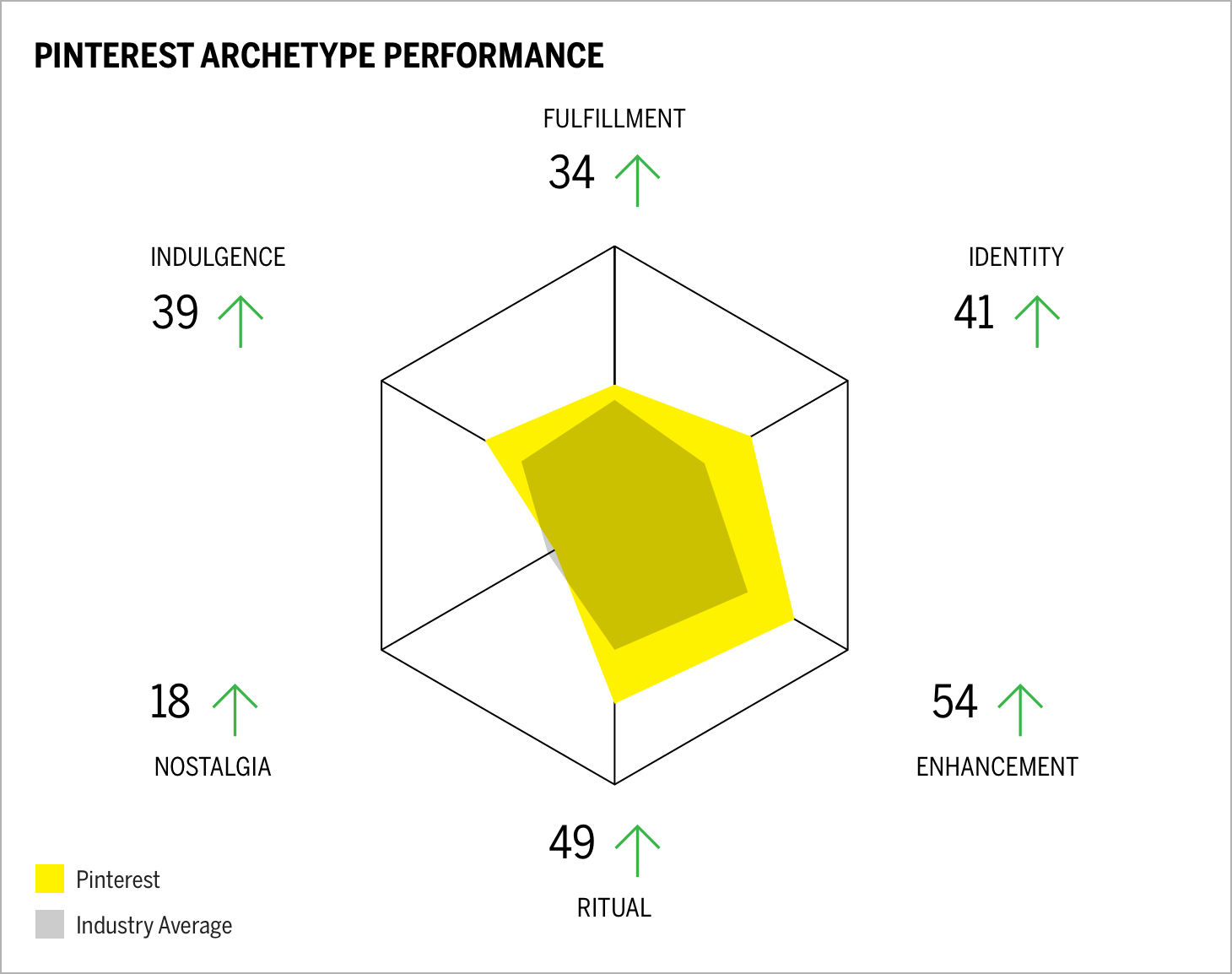
The two archetypes with which Pinterest is most closely associated, enhancement and ritual, are also the most prominent archetypes in the industry. This indicates that Pinterest successfully embodies the key characteristics that users associate with the industry. The enhancement archetype characterizes a brand that makes a user smarter, more capable, and more connected through its use. The ritual archetype is described as when a brand becomes a vitally important part of a user’s daily existence. Pinterest is the #1 brand for these two archetypes as well as the identity and indulgence archetypes. It also ranks #3 in the study overall for ritual and enhancement and #4 overall for identity. Ranking this highly for three of the six archetypes is astounding and demonstrates how strongly users associate these characteristics with the brand.
On the outskirts of the smartphone ecosystem
In studying the modern marketing landscape, we have noted that the smartphone plays an instrumental role in how consumers interact with brands and has an effect on Brand Intimacy. Brands that play an active role in or on smartphones are more intimate on average than those that don’t. We call this phenomenon the smartphone ecosystem.
The smartphone ecosystem
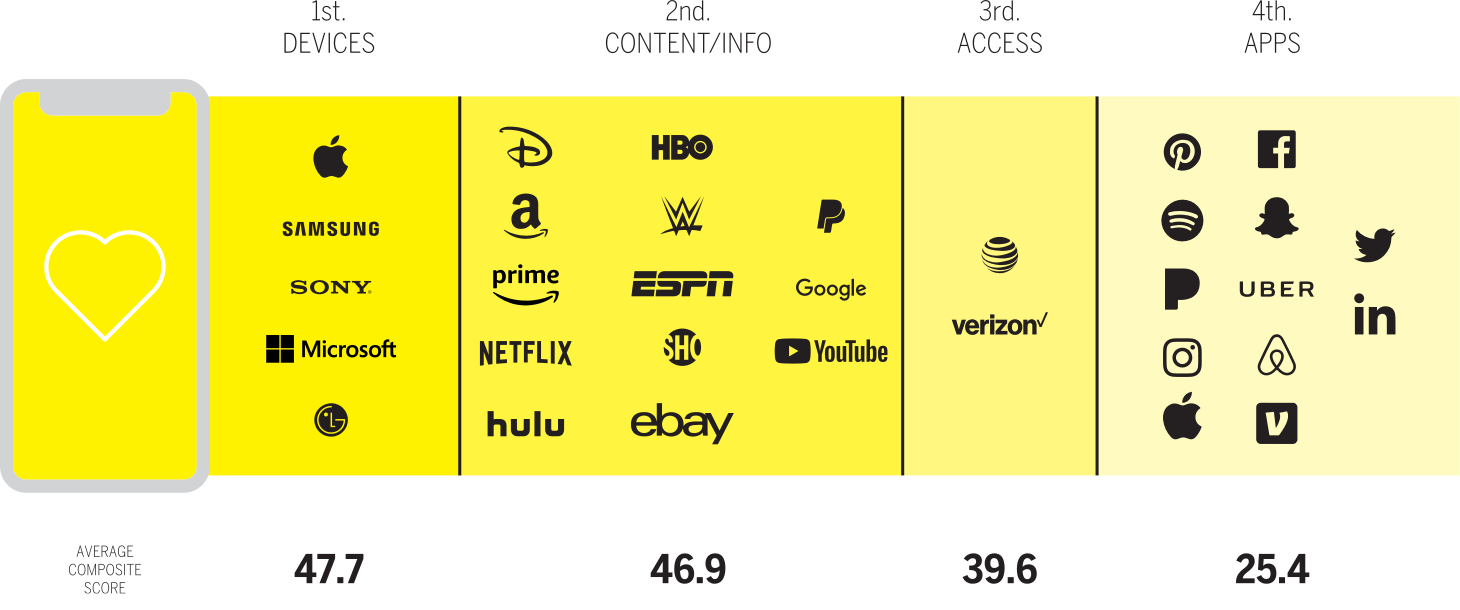
Unfortunately for brands like Pinterest, apps have the lowest average Brand Intimacy Quotient of the four categories within the ecosystem, behind access brands, content/information services, and device manufacturers. Our theory is that consumers ascribe the benefits of apps (and access brands and content providers) to the device—the physical object where all of these often-free services live. Free apps can easily be seen as utilities that users feel entitled to or see as mere added features of the smartphone. This means brands like Pinterest may have untapped potential to build further emotional connections with its audience. Currently, these connections are being obscured by consumers’ fixation on the device.
The good news for app brands is that they have improved their scores more than any other category in the smartphone ecosystem this year, increasing their average Brand Intimacy Quotient by an impressive 41 percent, compared to a 14 percent increase for access brands, a 3 percent increase for content services, and a 6 percent increase for devices. Perhaps as this category is maturing, consumers are becoming more willing to connect with the brands that live on their beloved devices.
Conclusion
Pinterest has proved its ability to build emotional relationships with its users. It is beloved by women, builds deeper connections than any other social media brand, and inspires some of the strongest associations in the category and in our study overall.
With Pinterest’s upcoming IPO and its increased adoption among men, it will be interesting to see how this brand evolves over the next few years. As we have seen this year, consumers’ feelings about brands in the apps & social platforms industry can change quickly. Compared to other industries, there are few barriers to adoption, switching, or abandonment here—almost nothing is stopping us from signing up for a new social platform today or deleting an app we’ve been using for years. Choosing to use an app or social platform has virtually no costs, and thus emotional attachment is an important tool needed to win over consumers. Brands that are able to create and maintain Brand Intimacy like Pinterest will have a unique advantage.
Read our detailed methodology here, and review the sources cited in this article here.
Check out our annual study and rankings of intimate brands. Visit our most recent rankings of intimate famous figures—BFF. Our Amazon best-selling book is available at all your favorite booksellers. To learn more about our Agency, Lab, and Platform, visit mblm.com.
